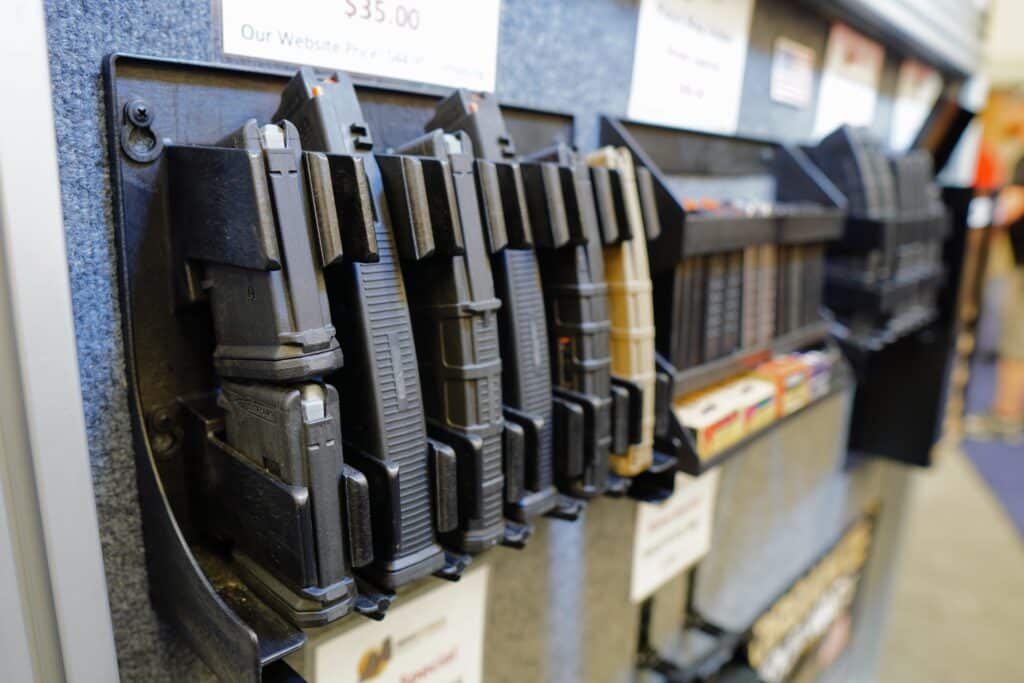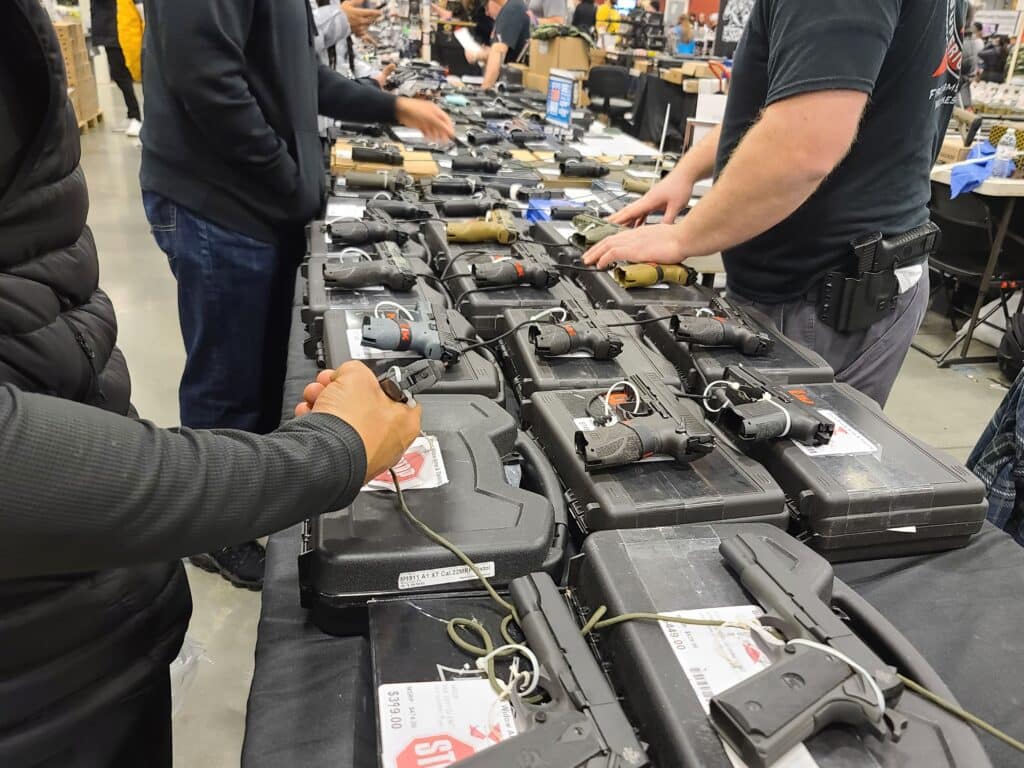Gun-rights advocates got some good news this week from two unexpected places. Washington and Oregon. State courts there found the local ammunition magazine bans unconstitutional.
Contributing Writer Jake Fogleman looks at those rulings and reasons through why they may–or may not–signal a better path to blocking those restrictions than the federal courts.
Then I take a look at the ATF’s latest rule on gun dealer licensing. Most of what’s in there is not new. The ATF has been saying much of this for years. But that doesn’t mean the rule won’t have a significant impact anyway.
Plus, the director of the National Journalism Center joins the podcast to talk about the gun reporting program we teach to up-and-coming writers.

Analysis: State Court Rulings Against Hardware Bans Offer Bright Spot for Gun-Rights Activists [Member Exclusive]
By Jake Fogleman
Two state courts in the Pacific Northwest gave gun-rights advocates some good news in challenges against magazine capacity restrictions this week. But is that sustainable?
On Friday, the Oregon Court of Appeals denied a request by the state’s attorney general to stay a lower court ruling declaring the state’s voter-approved ban on “large-capacity” magazines and permit requirement to purchase a firearm unconstitutional. It did so after finding that the gun-rights groups who challenged Measure 114 have “a legitimate likelihood of success on the merits” in the appeals process and that preventing the state from enforcing the measure merely preserves the status quo.
“Although the court acknowledges that the measure itself is intended to address an issue of great importance to the public, the motion does not present a sufficient basis to conclude that there is a nonspeculative likelihood of harm that will occur during the pendency of the appeal in the absence of a stay,” the court wrote in Arnold v. Kotek.
Meanwhile, just a few days prior, a Cowlitz County judge in Washington struck down the Evergreen State’s version of the ban as unconstitutional under both the state and US constitutions.
“This Court finds that an arm designed as a weapon and traditionally or commonly possessed in anticipation of self-defense is presumptively a protected arm in Washington State,” Superior Court Judge Gary Bashor wrote in State of Washington v. Gator’s Custom Guns. “The State must provide some history of regulation in line with the requirements of Bruen in order for Art. 1, § 24 to provide at least the protection of the right the Second Amendment does. The State has failed to do so.”
The two favorable rulings for gun-rights activists stand in stark contrast to the experience they have faced thus far in federal courts litigating similar restrictions.
With the exception of a since-stayed district court ruling striking down California’s ban, virtually all federal decisions in magazine ban cases issued since the Supreme Court’s Bruen decision have sided with the government—including cases involving the Washington and Oregon bans. That’s largely because federal judges with similar ideological predilections typically superintend the places that pass hardware bans, and judges across the country have already deployed a common analytical framework for upholding hardware bans under the Bruen test.
Success in state courts, by comparison, modest as it may be at this stage, could raise the question of whether state constitutional challenges offer more promise to litigants challenging hardware bans.
But there are reasons to be skeptical.
For one, many of the same issues involving ideological sympathy toward upholding local gun restrictions exist in state courts as they do in federal circuits, if not more so.
Though the judge struck down Washington’s magazine ban was on the merits, his ruling was almost immediately stayed thanks to some behind-the-scenes maneuvering by the state’s Attorney General and its Supreme Court. That progressive-leaning court will now take up the case on appeal. And though the Oregon ruling did not give similar deference to its state attorney general, the next court to set to review the law is made up entirely of Democratic appointees.
Additionally, state constitutional analysis is something of a wildcard. State courts, including those in places with their own state constitutional arms guarantees, are not necessarily bound to interpret restrictions on those guarantees through the same Bruen-inspired legal analysis that federal courts are. That leaves a lot of room for a wide variety of analytical frameworks.
Some states, including Iowa, Alabama, Louisiana, and Missouri, have adopted voter-approved requirements that state courts use strict scrutiny when reviewing challenges to gun laws under their respective state constitutional arms guarantees. That standard is the most stringent tier of scrutiny for government action in constitutional challenges under the interest-balancing framework–one rejected by the Supreme Court in Bruen. A restriction must be “narrowly tailored” or the “least restrictive means” of achieving a “compelling governmental interest” to pass muster under strict scrutiny, a bar the government fails to clear more often than not.
On the other end of the spectrum, the Supreme Court of Hawaii held last year ruled that the state’s constitutional arms provision does not protect any individual gun rights despite being effectively identical to the federal Second Amendment.
“Article I, section 17 of the Hawaiʻi Constitution mirrors the Second Amendment to the United States Constitution,” the Hawaiian court wrote in Hawaii v. Wilson. “We read those words differently than the current United States Supreme Court. We hold that in Hawaiʻi there is no state constitutional right to carry a firearm in public.”
“The text of article I, section 17, its purpose, and Hawaiʻi’s historical tradition of weapons regulation support a collective, militia meaning,” the court added.
Meanwhile, Judge Bashor based his approach to Washington’s state arms rights provision on the Supreme Court’s analyses in Heller and Bruen.
“The Washington Supreme Court, through Evans and Sieyes, has adopted the US Supreme Court approach which prohibits balancing tests when analyzing general laws limiting rights under Art. 1, § 24,” he wrote.
In other words, state constitutional interpretations of the right to keep and bear arms run the gamut. While gun-rights activists may achieve individual victories at the state level, the federal courts will probably continue to be their best hope for lasting success. After all, the Second Amendment and the Supreme Court’s interpretation of it ultimately set the floor for what types of gun restrictions are permissible in all 50 states.
Podcast: How the National Journalism Center and I Are Training New Reporters on Gun Politics [Member Early Access]
By Stephen Gutowski
This week, we’re doing something a bit different.
I’ve been working with the National Journalism Center for a long time. They have a great program to train up-and-coming reporters. And we’ve been doing a range day as part of that training in recent years.
So, the program’s director, T. Becket Adams, joined me on the show to discuss what our gun reporting lesson looks like. He also gave his assessment of how much of the media covers firearms, the problem with the approach, and the solution to it. Part of that solution, he said, includes real-world training on key issues in gun politics as well as on how guns function.
That’s exactly what we give to the young reporters who come through our class. Becket said our program is the only of its kind he’s ever heard of, and hopes other groups and media outlets adopt or replicate what we’re doing.
You can listen to the show on your favorite podcasting app or by clicking here. Video of the show is available on our YouTube channel. An auto-generated transcript can be found here. Reload Members get the show on Sunday, as always. Everyone else can listen on Monday.
This week’s news update is also available in audio or video. Contributing Writer Jake Fogleman and I discuss the ATF’s new rule casting a cloud over used gun sales, Tennesee putting school safety training in schools, and much more.

Analysis: Will Biden’s New Gun Dealer Rule Have Much Effect? [Member Exclusive]
By Stephen Gutowski
The short answer is yes. The longer answer is not as clear.
On Thursday, the ATF published its final rule codifying new standards for what it means to be “in the business” of selling guns and, therefore, need a Federal Firearms License (FFL). The rule points to a number of specific indicators for determining if somebody is dealing guns “predominantly for a profit” as a business. But it also doesn’t draw hard lines on how many guns somebody can sell or how much money they can make before needing a license.
It will probably impact how Americans sell guns, but perhaps not in the way people might first expect.
But, despite the fanfare and claims of the Biden Administration, it doesn’t significantly change the ATF’s position on who needs a license. Nor does it outlaw private sales by unlicensed people at gun shows or elsewhere.
It’s true the rule says there’s no specific number of sales that determines who needs a license. It says it doesn’t matter where a sale takes place. It says renting a table at a gun show could indicate somebody is engaged in the business.
But that’s what the ATF has been saying for a very long time. None of this is new. If you look back at a similar move under the Obama Administration in 2016, you’ll find many of the same talking points at play. One of the big talking points at the time was even those selling a single gun could have to get a license–something repeated in this rule.
“ATF will make clear that whether you are ‘engaged in the business’ depends on the facts and circumstances,” White House Senior Adviser Valerie Jarrett said at the time. “On factors such as: whether you represent yourself as a dealer, such as making business cards or taking credit card statements. Whether you sell firearms shortly after they’re acquired or whether you buy or sell in the original packaging.”
The ATF’s 2016 guide to determining whether you need an FFL hits all the major factors included in the new rule, too.
“Federal courts have identified several factors that can help you determine on what side of that line your activities fall,” the guide reads. “They include: whether you represent yourself as a dealer in firearms; whether you are repetitively buying and selling firearms; the circumstances under which you are selling firearms; and whether you are looking to make a profit. It is important to note that no single factor is determinative, and that the relative importance of any of the factors will vary depending on the facts and circumstances applicable to the individual seller.”
The fact this guidance is now a federal rule does bolster its authority. It also opens it up to legal challenges. Though, it may be a heavier lift for gun-rights activists since it is at least tied to Congressional action.
But it’s unlikely the ATF will arrest the more than 25 thousand people it claims are selling guns in violation of these standards. More prosecutions could come, but they’ll probably come as much as a result of the publicity surrounding the rule than from its actual contents. Similarly, much of the rule’s real-world impact will probably come in the way it casts doubt over who should and shouldn’t get a license. The law-abiding may well opt not to sell a used gun themselves because of the confusion.
The PR blitz is probably the most significant part of all this. When coupled with the vagueness of several of the standards, it could result in people deciding to try and get FFLs before selling guns.
Of course, that runs into several other issues. One, you have to actually be in the business to get an FFL. The ATF will not give you one just because you want to perform background checks while selling guns. So, you’ll have to make the case you are operating a bona fide business.
However, that’s not always easy. Ironically, that’s due to a Clinton-era crackdown on so-called kitchen table dealers. Back then, the ATF said 70% of FFLs weren’t real business and worked to tighten application requirements. As a result, the number of licensed dealers dropped from about 252,000 in 1993 to about 55,000 by 2014.
The two reforms obviously conflict. So, the new rule puts a dark cloud over many Americans without a clear way out from under it. But the 2016 guidance did something similar, and few people headed that call. In fact, the number of licensed dealers was down to 52,910 by 2022.
It’s hard to say how people or prosecutors will react to the rule. The real tell will be if and when more charges are brought for dealing guns without a license and whether judges start issuing broader convictions. That process will take time to play out.
But, since the new rule is so similar to the ATF’s previous guidance, there’s reason to think there won’t be a sea change.
That’s it for now.
I’ll talk to you all again soon.
Thanks,
Stephen Gutowski
Founder
The Reload







